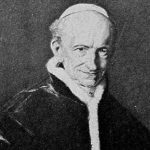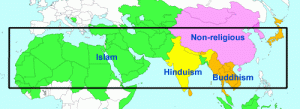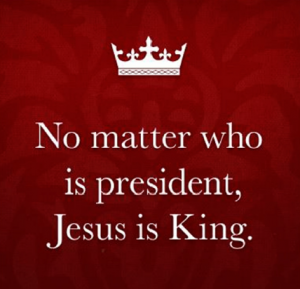
Below is the third paragraph of On Jesus Christ the Redeemer, the Encyclical letter of Pope Leo XIII in November, 1900. You will quickly discover that the excerpt is not quick and easy reading. Yet I find it to be a beautiful summary of the prophetic revelation of Jesus as the coming Savior of the World in the Old Testament.
3. The greatest of all misfortunes is never to have known Jesus Christ: yet such a state is free from the sin of obstinacy and ingratitude. But first to have known Him, and afterwards to deny or forget Him, is a crime so foul and so insane that it seems impossible for any man to be guilty of it. For Christ is the fountain – head of all good. Mankind can no more be saved without His power, than it could be redeemed without His mercy. “Neither is there salvation in any other. For there is no other name under heaven given to men whereby we must be saved” (Acts IV, 12). What kind of life that is from which Jesus Christ, “the power of God and the wisdom of God,” is excluded; what kind of morality and what manner of death are its consequences, can be clearly learnt from the example of nations deprived of the light of Christianity. If we but recall St. Paul’s description (Romans I., 24-32) of the mental blindness, the natural depravity, the monstrous superstitions and lusts of such peoples, our minds will be filled with horror and pity. What we here record is well enough known, but not sufficiently realised or thought about. Pride would not mislead, nor indifference enervate, so many minds, if the Divine mercies were more generally called to mind and if it were remembered from what an abyss Christ delivered mankind and to what a height He raised it. The human race, exiled and disinherited, had for ages been daily hurrying into ruin, involved in the terrible and numberless ills brought about by the sin of our first parents, nor was there any human hope of salvation, when Christ Our Lord came down as the Saviour from Heaven. At the very beginning of the world, God had promised Him as the conqueror of “the Serpent,” hence, succeeding ages had eagerly looked forward to His coming. The Prophets had long and clearly declared that all hope was in Him. The varying fortunes, the achievements, customs, laws, ceremonies and sacrifices of the Chosen People had distinctly and lucidly foreshadowed the truth, that the salvation of mankind was to be accomplished in Him who should be the Priest, Victim, Liberator, Prince of Peace, Teacher of all Nations, Founder of an Eternal Kingdom. By all these titles, images and prophecies, differing in kind though like in meaning, He alone was designated who “for His exceeding charity wherewith He loved us,” gave Himself up for our salvation. And so, when the fullness of time came in God’s Divine Providence, the only-begotten Son of God became man, and in behalf of mankind made most abundant satisfaction in His Blood to the outraged majesty of His Father and by this infinite price He redeemed man for His own. “You were not redeemed with corruptible things as gold or silver . . . but with the precious Blood of Christ, as of a lamb, unspotted and undefiled” (1 Peter I., 18-19). Thus all men, though already subject to His Kingly power, inasmuch as He is the Creator and Preserver of all, were over and above made His property by a true and real purchase. “You are not your own: for you are bought with a great price” (2 Corinthians VI, 19-20). Hence in Christ all things are made new. “The mystery of His will, according to His good pleasure which He hath purposed to Him, in the dispensation of the fullness of times to re-establish all things in Christ” (Ephesians I., 9-10). When Jesus Christ had blotted out the handwriting of the decree that was against us, fastening it to the cross, at once God’s wrath was appeased, the primeval fetters of slavery were struck off from unhappy and erring man, God’s favour was won back, grace restored, the gates of Heaven opened, the right to enter them revived, and the means afforded of doing so. Then man, as though awakening from a long-continued and deadly lethargy, beheld at length the light of the truth, for long ages desired, yet sought in vain. First of all, he realised that he was born to much higher and more glorious things than the frail and inconstant objects of sense which had hitherto formed the end of his thoughts and cares. He learnt that the meaning of human life, the supreme law, the end of all things was this: that we come from God and must return to Him. From this first principle the consciousness of human dignity was revived: men’s hearts realised the universal brotherhood: as a consequence, human rights and duties were either perfected or even newly created, whilst on all sides were evoked virtues undreamt of in pagan philosophy. Thus men’s aims, life, habits and customs received a new direction. As the knowledge of the Redeemer spread far and wide and His power, which destroyeth ignorance and former vices, penetrated into the very life-blood of the nations, such a change came about that the face of the world was entirely altered by the creation of a Christian civilisation. The remembrance of these events, Venerable Brethren, is full of infinite joy, but it also teaches us the lesson that we must both feel and render with our whole hearts gratitude to our Divine Saviour.










